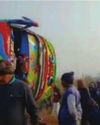
On Boxing Day 2004, an earthquake in the Indian Ocean near Indonesia set off a tsunami which killed almost 250,000 people. It was the deadliest natural disaster this century, and was probably the deadliest tsunami in human history.
As coastal engineers who specialise in tsunamis and how to prepare for them, we have seen how the events of 2004 reshaped our global disaster management systems. Among the lessons learned since that day, three themes stand out.
First, the importance of early warning systems, providing time to escape impact zones. Second, the importance of local preparations and educating people about the risks. Finally, the ongoing need for—but not overreliance on—coastal defences.
The absence of a comprehensive early warning system contributed to the devastating loss of life in 2004. About 35,000 people died in Sri Lanka, for instance, which wasn't hit until two hours after the earthquake.
Significant investment has been made in the years since, including the Indian Ocean tsunami warning system which operates across 27 member states. This system was able to issue warnings within eight minutes when another earthquake struck the same part of Indonesia in 2012. Similarly, when an earthquake hit Noto, Japan, in January 2024, swiftly issued tsunami warnings and evacuation orders undoubtedly saved lives.
This story is from the {{IssueName}} edition of {{MagazineName}}.
Start your 7-day Magzter GOLD free trial to access thousands of curated premium stories, and 9,000+ magazines and newspapers.
Already a subscriber ? Sign In
This story is from the {{IssueName}} edition of {{MagazineName}}.
Start your 7-day Magzter GOLD free trial to access thousands of curated premium stories, and 9,000+ magazines and newspapers.
Already a subscriber? Sign In
DADIMA TALES
When I was a primary school student, 'Dalmia' brand of glucose biscuits were very popular. They were consumed with tea in middle-class households like ours.

H-1B visas
SIR, I refer to \"H1-B Dilemma\" (January 1). Donald Trump's endorsement of the H1-B visa program amid the debate between Elon Musk and Steve Bannon reflects a calculated yet controversial stance on immigration policy.
Toxic Legacy
Four decades after the catastrophic gas leak that devastated Bhopal, the recent removal of toxic waste from the Union Carbide plant marks a small yet significant step in addressing the lingering fallout of one of the world's worst industrial disasters.
Dense fog paralyses Delhi-NCR, most of North India
North India came to a standstill on Saturday, as intense cold waves and dense fog blanketed the region, causing widespread disruptions.

Nationalistic identity and pride
(An excerpt from 'India's New Right: Powering The Current Wave of Nationalism and Civilisational Revival')

Operation Iron Tempest and the treachery around narcotics
(An excerpt from 'The Nukes, the Jihad, the Hawalas and Crystal Meth')

Paribesh Bandhab Haat: Celebration of tradition and sustainability
Upon entering the Paribesh Bandhab Haat, one is immediately carried away to a different realm of vibrant hues, cheerful faces and a serene atmosphere nestled in the lap of nature.
Two more arrested in Malda TMC leader's murder case
Two more suspects have been arrested in connection with the murder of popular Trinamul Congress leader Babla Sarkar.

Bus from Kolkata topples near Mukutmanipur, 15 injured
A bus carrying picnic revellers from Kolkata toppled near Mukutmanipur, a tourist destination in Bankura this morning, leaving at least 15 injured.
South Bengal Sports Carnival
Soccer star Bhichung Bhutia will lead a marathon with the participants to give a boost to the games